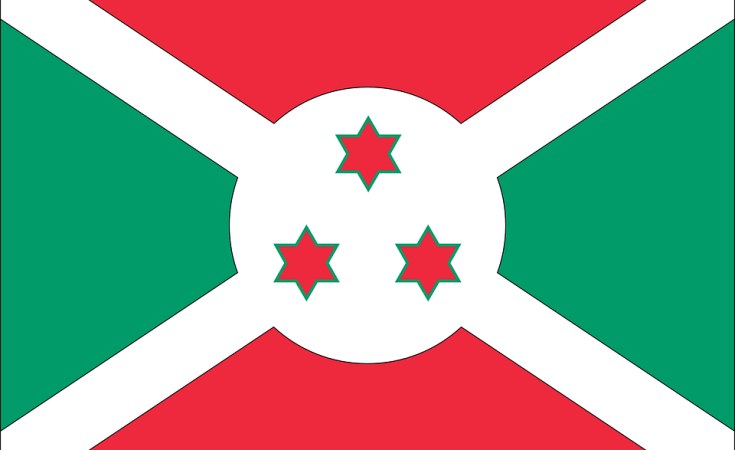Release Floriane Irangabiye; End Politicized Prosecutions
The conviction of the Burundian journalist Floriane Irangabiye on charges of "undermining the integrity of the national territory" on January 2, 2023, violates her rights to free speech and to a fair trial, Human Rights Watch said today. The High court of Mukaza sentenced her to 10 years in prison and a fine of 1,000,000 Burundian Francs (US$ 480). Irangabiye's lawyers lodged an appeal on January 23.
According to the court verdict, her conviction is based on an August 2022 Radio Igicaniro broadcast she hosted during which she interviewed a human rights defender and a journalist in exile, who both criticized Burundi's human rights record.
"Floriane Irangabiye's conviction highlights the Burundian authorities' manipulation of the justice system to shut down criticism," said Clémentine de Montjoye, Africa researcher at Human Rights Watch. "If the Burundian authorities are serious about reforms, they should end their vendetta against those they perceive to be against the government, including the scores of journalists and human rights defenders who fled after the country's 2015 political crisis."
During Irangabiye's December 16 trial, the prosecution based its accusations on her work as a commentator and host on Radio Igicaniro, an online outlet that airs critical commentary and debates on Burundian politics and culture. The journalist she interviewed during the program, Bob Rugurika, is the director of Radio publique africaine. He was convicted in absentia of state security crimes alongside 11 other journalists and human rights defenders after an unfair trial in 2020.
Based on the verdict, the prosecution cited Irangabiye's regular trips between Rwanda, where she was based, and Burundi, and accused her of criticizing the Burundian government and inciting youth to overthrow the government, including by taking part in meetings with Burundian youth in exile in Rwanda. It also cited photos in which she appeared with Rwandan President Paul Kagame and former Burundian President Pierre Buyoya, who was convicted in absentia over the 1993 assassination of his successor - Melchior Ndadaye - and sentenced to life in prison in November 2020.
The court verdict, and lengthy prison sentence, appears to be based on Irangabiye's role, as a journalist, interviewing guests critical of the government on a radio show. The court dismissed arguments based on the right to free expression under the constitution of Burundi. However, the court's conviction and sentencing of Irangabiye are based on a crime that is vague, and open to arbitrary misuse to prosecute people for peaceful criticism and comment. It therefore amounts to a violation of freedom of expression.
Irangabiye was taken into custody on August 30, 2022, when she was intercepted by national intelligence agents while on her way to a relative's funeral in Matana, in southern Burundi, according to a relative. She had traveled from Rwanda to Burundi in mid-August. After her arrest, a relative said that she was transferred to the national intelligence services' headquarters in Bujumbura, where she was interrogated without a lawyer. She was held there until September 8.
Based on the verdict, during her trial, Irangabiye's defense team asserted that the court should disregard the answers she gave during these interrogations, but the court dismissed the request.
Irangabiye was held without charge until October 27, in violation of the Burundian Code of Criminal Procedure as well as of African and international human rights standards on the right of everyone held in pretrial detention to be promptly charged or released. During an appearance before a pretrial court chamber, the prosecutor reportedly requested more time to gather evidence. She was transferred to Mpimba central prison, in Bujumbura, on September 8, and then, in late September, national intelligence agents transferred her to Muyinga prison in northeastern Burundi.
Irangabiye's months-long detention without charge and the prosecutor's failure to produce credible evidence of a crime amount to flagrant violations of several fair trial principles enshrined in Burundian and international law, Human Rights Watch said.
Sylvestre Nyandwi, Burundi's prosecutor general, told the Committee to Protect Journalists (CPJ) in a statement that Irangabiye's case complied with Burundian criminal procedures and laws and that her conviction was not politically motivated.
Many Burundian human rights defenders and journalists fled the crackdown that followed the 2015 protests over the former president's bid for a controversial third term. They remain in exile due to the continuing threats made against them by Burundian authorities, Human Rights Watch said.
Irangabiye's conviction comes shortly after the acquittal and release of Tony Germain Nkina, a lawyer and former human rights defender who was unjustly imprisoned for more than two years. He was convicted of collaborating with a rebel group and sentenced to five years in prison following an unfair trial during which the prosecution presented no credible evidence. On December 6, 2022, the Supreme Court quashed his conviction, and the Court of Appeal of Ngozi acquitted him on December 20 after a retrial.
The government's hostility toward Burundi's once thriving civil society and media has continued despite the election of a new president in May 2020. Twelve human rights defenders and journalists in exile were convicted in June 2020 of participating in a May 2015 coup attempt. The verdict, which was only made public in February 2021, came after a deeply flawed trial during which the defendants were absent and did not have legal representation, flouting even the most basic due process principles. The group was found guilty of "attacks on the authority of the State," "assassinations," and "destruction."
"Floriane Irangabiye's conviction shows that the crackdown against those who criticize the government is far from over," de Montjoye said. "Burundian authorities should carry out substantive reforms to address the lack of judicial independence, end politicized prosecutions, and ensure accountability for abuses committed since 2015."


